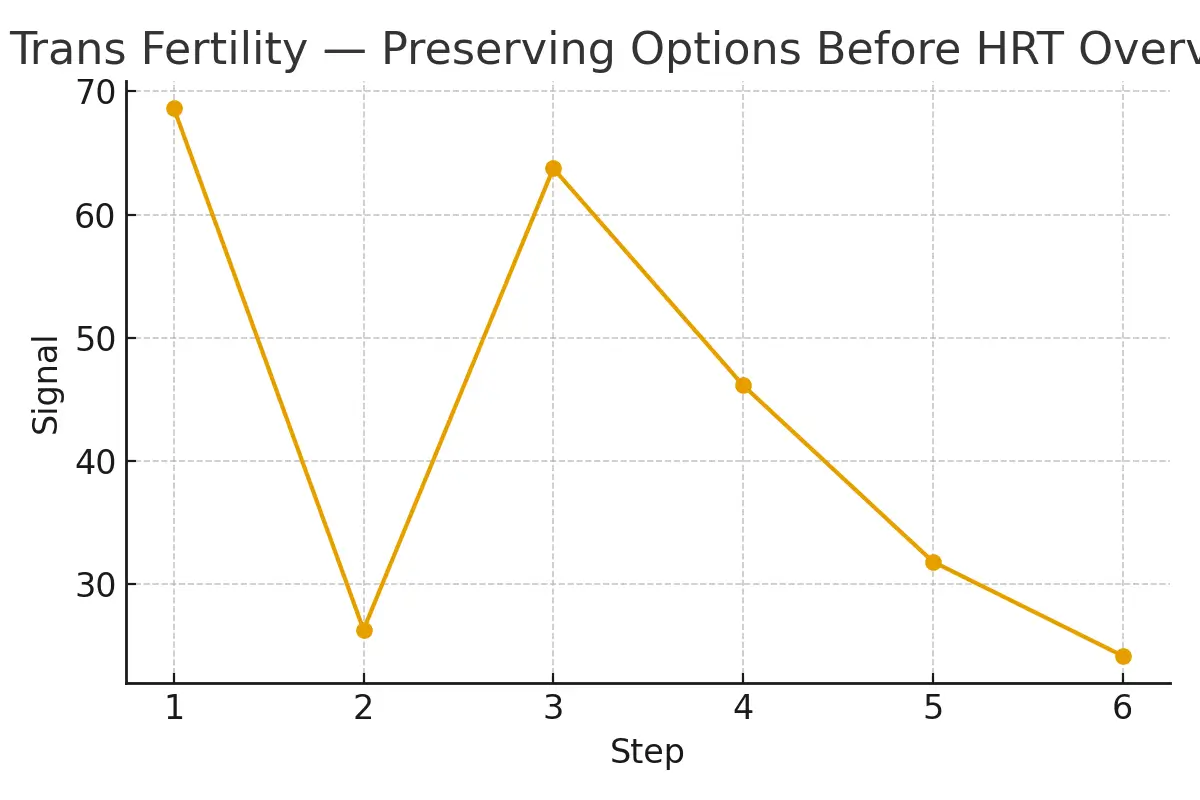
This guide explains fertility preservation for trans individuals who are considering hormone replacement therapy (HRT). It focuses on the choices that truly impact outcomes, budgets, and timelines, so you can move forward with clarity and confidence.
What It Is
Trans fertility preservation before HRT means making decisions about egg, sperm, or embryo storage before starting gender-affirming hormone treatments. Doing this early can protect future family-building options and prevent regret later.
Who It Helps
- Good fit: Those about to start HRT, younger patients, or anyone with strong egg/sperm counts in lab tests.
- Consider other paths: Older age, prior treatments that reduced fertility, or poor test results may make donor gametes or embryo adoption a better option.
Step-by-Step Process
- Initial consult & labs – establish baseline fertility.
- Imaging & screening – confirm reproductive health.
- Preservation cycle – egg, sperm, or embryo freezing.
- Storage & planning – secure long-term options before HRT begins.
Checkpoints at each stage reduce stress and protect quality.
Pros & Cons
Pros
- Protects future biological parenthood options
- Flexibility in timing family building
- One-time effort with long-term benefit
Cons
- Upfront costs can be significant
- Medical procedures may feel emotionally complex
- Delays starting HRT for a short period
Costs & Logistics
- Line items: Retrieval, storage fees, medications, labs, legal steps
- Insurance: May or may not cover fertility preservation—check for pre-authorizations
- Budget tips: Use escrow or staged payments to avoid surprise bills
What Improves Outcomes
- Freezing before HRT begins (better quality)
- Transparent cost tracking
- Aligning lab cutoffs with biology
- Early mental health support for stress reduction
- Choosing clinics with strong lab quality indicators
Case Study
One patient, unsure whether to delay HRT, chose a short egg-freezing cycle first. With clear checklists, they preserved embryos and then started HRT within weeks—avoiding regret while staying on their transition timeline.
Mistakes to Avoid
- Waiting too long to test fertility
- Assuming HRT effects are always reversible
- Skipping legal/financial planning
- Not clarifying clinic communication standards
- Overlooking emotional support needs
FAQs
Q. Do I have to stop or delay HRT for fertility preservation?
Ans : Yes, fertility preservation must be done before starting HRT or after a washout period, which can be emotionally and physically difficult. Acting before HRT is usually simpler.
Q. How long can frozen eggs, sperm, or embryos last?
Ans : With proper storage, they can remain viable for decades—time is not the limiting factor, cost and storage planning are.
Q. What if my labs show low fertility potential?
Ans : Options like donor sperm, donor eggs, or embryo adoption are available and often lead to excellent success rates.
Q. Is fertility preservation covered by insurance?
Ans : Coverage varies widely. Some policies cover medically necessary preservation, others don’t. Always confirm pre-authorization before starting.
Q. Can I do this if I’ve already started HRT?
Ans : Possibly. Some patients stop HRT temporarily for a retrieval cycle, but results vary. The earlier preservation happens, the better the chances.
Next Steps
- Free 15-min nurse consult
- Upload your labs for personalized feedback
- Get a cost breakdown tailored to your case
- Preserving fertility before HRT is a powerful way to protect your future family-building options without sacrificing your transition goals.

Dr. Kulsoom Baloch
Dr. Kulsoom Baloch is a dedicated donor coordinator at Egg Donors, leveraging her extensive background in medicine and public health. She holds an MBBS from Ziauddin University, Pakistan, and an MPH from Hofstra University, New York. With three years of clinical experience at prominent hospitals in Karachi, Pakistan, Dr. Baloch has honed her skills in patient care and medical research.





